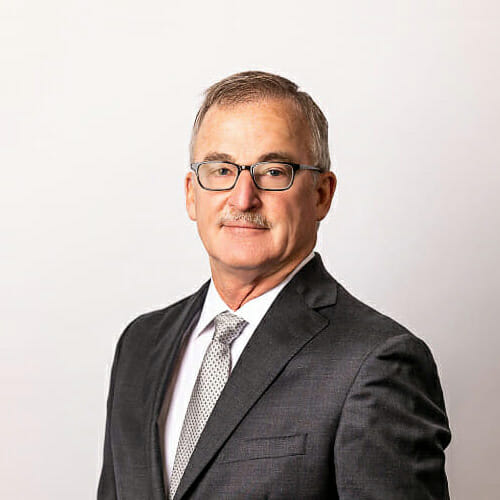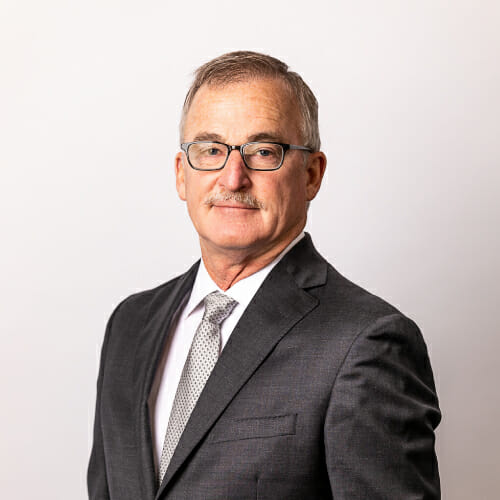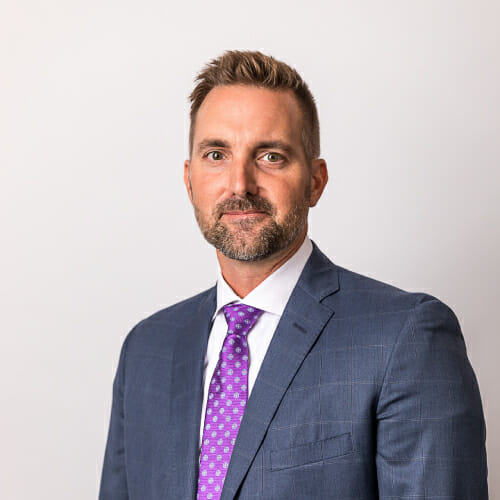$48.5
Million
Truck Accident Case
We took more than 60 depositions in five different states. Because of Stephenson’s tireless advocacy, shortly before the trial was to commence, the defendants settled the case for $48.5 million.
Our Commercial Vehicle Crash Lawyer Helps Win Compensation
In cases where commercial motor vehicles (CMVs) and passenger vehicles collide, those in the passenger vehicles have a higher likelihood of suffering severe injuries or death, because CMVs are usually much larger than passenger vehicles.
Determining who is legally responsible for paying for damages and injuries—that is, determining liability—is always necessary and not always easy to do. This is why, if you or a loved one has been injured or someone has died in an accident with a CMV, it’s important to talk to a commercial vehicle accident lawyer to help you get compensation.
Determining liability in these crashes can be quite complicated, but it is critical to do so to ensure that the injured parties receive the compensation they deserve. While no compensation can make up for severe damages such as a death or a loss of bodily function, the law provides a settlement that relieves victims of financial burdens and allows them to go on with their lives.
However, there are complex laws regarding liability. Commercial vehicle corporations, their insurance companies and their lawyers will attempt to deny your claim, get you to settle for the lowest amount possible, or trick you into making statements that can be used against you. Having an attorney experienced with CMV accidents on your side to fight for a fair settlement can help keep you from making costly mistakes.
At Stephenson Rife, we have the skills and experience to help struggling families after a crash involving a commercial motor vehicle such as a large truck, semi, tractor trailer or bus. We know the laws, the courts and the tactics insurance companies use, and are fully prepared to prepare a case to fight for justice and the compensation that will allow you to get through this difficult time. Let us take the burden off you by handling all legal hurdles to get you the settlement you deserve.
How Our Commercial Vehicle Injury Attorney Helps
Why Choose Stephenson Rife
Commercial vehicle cases are extremely complicated, and large commercial companies often have deep pockets to fight lawsuits, so it is important to find an attorney you not only feel comfortable with and have confidence in, but one with the experience necessary to go up against these defendants. Here are some reasons why we believe that Stephenson Rife is your best choice:
- We are experienced. We have been meeting the needs of people throughout Indiana since 1976. Mike Stephenson has 40 years of experience handling injuries and is a trusted advisor to many individuals and companies. Brady Rife handles serious personal injury matters and has successfully tried both jury and bench trials as lead counsel.
- We get results, win large settlements, and have many satisfied clients. You can read their testimonials and about their cases.
- We are recognized in our field. Attorneys Mike Stephenson and Brady Rife have both been named as Indiana Super Lawyers and have won distinguished legal awards.
- We handle all legal paperwork and court appearances required by Indiana law.
- We deal and negotiate with insurance companies, so you won’t have to.
- We are recognized for our expertise and are the law firm that other law firms consult.
- We offer free initial consultations to get you started.
- We are able to provide cost-effective legal services to keep fees low, and you pay us nothing unless we win and you get your money.
Our Commercial Vehicle Injury Lawyer Works for You
When you have our Stephenson Rife attorneys on your side, we will get to work on your behalf immediately. We will:
- Meet with you to discuss how the accident occurred and who the at-fault parties may be and determine if you have a valid lawsuit and what type of settlement to go after.
- Make sure you get proper medical care for your neurological damage and all symptoms and treatments are documented.
- Conduct investigations to gather evidence, such as photographs and videos from the accident scene, and police, ambulance, hospital, and medical records and reports.
- Interview witnesses and first responders.
- Get expert opinions from accident reconstruction professionals as to how the accident occurred and who was at fault, and from medical professionals and therapists as to the care you will need and the costs and effects on your life into the future.
- Negotiate with insurance companies and opposition lawyers for a fair settlement.
- Build your case and bring it to court and present it in front of a judge and jury if necessary.
Damages Our Commercial Vehicle Accident Lawyers May Recover
In a successful CMV accident case, you may recover compensation for your injuries and financial losses, called damages. In Indiana, these should cover your economic or monetary losses resulting from the accident and your noneconomic damages as well.
Economic damages may include compensation for:
- Present and future medical and rehabilitation expenses
- Lost income from being unable to work
- Property damage from the crash
Noneconomic damages cover losses that do not have a specific dollar value but negatively impact your life, such as physical and emotional pain and suffering, mental anguish, anxiety, and depression, loss of quality of life and consortium, and post-traumatic stress disorder caused by the accident.
In some rare cases, punitive damages may also be awarded to punish negligent parties for willful negligence or especially egregious behavior. Punitive damages are over and above actual economic and non-economic damages and serve to act as a deterrent for similar misconduct in the future.
Amounts of Damage Awards
A wide range of settlement amounts are possible in a CMV case, ranging from the thousands to millions of dollars. The amount that you receive will depend on the individual circumstances of your case and factors that include:
- The extent, seriousness, and permanence of your injuries and whether you will need continuing care
- Your actual costs for medical expenses, lost wages, and property damage
- Your age, family situation, and earning capacity
- The availability of insurance and assets to go toward a settlement
- The inclination of a particular judge and jury
- Whether a wrongful death was involved
- The skill of your attorney in negotiating, building, and presenting your case
Featured Article: Four Ways the Trucking Industry Can Make Roads Safer

By and large, truck transport companies seem to view safety regulations as a burden to be resisted when possible, and grudgingly endured only when active resistance fails. Rather than leading in safety, trucking’s default position is to oppose new regulations, usually decrying economic harm if they are required to add new safety devices to their trucks or to alter work practices to reduce driver fatigue.
While European truck manufacturers have added advanced safety systems for decades, only recently have North American carriers lessened their resistance to implementing them. And the irony is, the Europeans continue proving that safety is good for business.
Proving Negligence in a CMV Accident
CMV accidents are especially complicated because of the various laws involved. Commercial vehicles that travel interstate are regulated not only by Indiana laws, but by the Federal Motor Carrier Safety Administration (FMCSA). They have to adhere to rules that may include safety standards, training, supervision, and the hours that drivers are allowed to drive without resting.
In addition, the trucking industry has changed a lot over the years. The days of trucking companies’ being staffed by employees went out the window when the industry was transformed by deregulation. These days, the driver behind the wheel of a truck could be an employee, an owner-operator who drives his or her own truck, or an independent driver hired to drive the company’s truck.
In the current regulatory environment, liability for an accident could fall upon a number of responsible parties. Theories and scenarios of liability may point the finger of blame at one or more of the following:
- The employer, when the driver is a regular employee of the trucking company. The accident would need to have happened when the driver was working “within the scope of his employment.”
- The employer, when the driver was hired negligently, meaning that the trucking company should have known that the driver was incompetent or discovered the driver was incompetent at some point and did not dismiss them.
- The business entity is leasing the truck and driver. If the trucking company hires an owner-operator (an independent contractor who drives their own truck), and the owner-operator works exclusively for the trucking company, then the one doing the leasing/hire is liable. However, these days owner-operators work for more than one trucking company, so in such cases the driver or owner-operator would be liable.
- Insurance companies for negligent hiring. Often, small companies rely on an insurance company to determine whether an applicant is incompetent (meaning, whether or not the driver is “insurable”). Thus, if an insurance company wrongly deems that a negligent driver is alright, it’s possible that the insurance company could be liable.
- The broker or “middle man” between the shipper and the trucking company who arranges transportation. While the broker does not hire the driver, the broker can be liable for negligent hiring of a trucking company with a bad safety record. (Before hiring a trucking company, a broker must check, at minimum, the company’s safety evaluations and records.)
- The shipper or the one who loaded the trailer. If the shipper improperly or negligently loads the trailer, or if they have ultimate control over the process of transporting the load, then the shipper can potentially be held liable.
- The driver or owner-operator. When independent drivers (who do not own their own truck) or owner-operators (who do own their own truck) are moving a load, liability often shifts from the trucking carrier, the shipper, or the broker to the driver or owner-operator. Generally, if the driver is not an employee of the trucking company, then the driver shares in some of the liability of an accident. Drivers and owner-operators are responsible for a certain amount of maintenance and of checking the load and the truck for problems while in transit, another area that can create liability.
- A combination of liable parties, if driver fatigue is determined to be a factor. Federal regulations prohibit trucking companies from pressuring drivers, whether employees or independents, from driving beyond certain specified daily time limits. However, if the driver decides on their own to drive beyond the legal limits and then has an accident, the driver could be found liable instead of the trucking company or other hiring entity.
- The maker of equipment that fails. If a part on the tractor or trailer is defective, causing a driver to lose control (such as defective brakes or steering), then the liability may lie with the company that manufactured the part.
- Other drivers on the road. Sometimes other drivers cause an accident, such as when they cut off a tractor-trailer. Large CMVs cannot maneuver or stop as quickly as smaller vehicles and can jackknife or lose control while attempting to avoid an accident.
To win your CMV accident case, our attorneys would have to identify each party who contributed to the crash (the defendants in the case), and prove they were negligent by showing the existence of the following elements:
- Duty — The defendant owed you a duty of care not to cause harm.
- Breach — The defendant breached that duty by acting or failing to act.
- Cause – This breach caused a crash and your injuries.
- Damages — You suffered damages, monetary or otherwise, as a result.
It is important to include all potentially negligent parties as defendants as they all may have insurance and assets that can go toward a settlement.
Suppose the Commercial Vehicle Driver’s Actions Were Intentional?
Even if the driver were an employee of the trucking company, if the actions causing the accident were intentional, the driver would generally be liable. Verifying intent often triggers punitive damages, meaning reckless actions or deliberate actions caused the damages and injuries in question. Punitive damages can greatly increase a damage award.
Get Help from Our CMV Accident Lawyers
If you were in a serious CMV crash, it is critical to have a knowledgeable and trustworthy legal professional representing you. The personal injury lawyers at Stephenson Rife bring the full weight of our 30+ years of experience and substantial financial resources to bear on each case we handle and are fully prepared to fight for optimum compensation that covers all your losses.
Be aware that there are time limits for filing. Indiana has a statute of limitations for most personal injury claims. According to law (Indiana Code (IC) 34-11-2-4(3)) you must file a claim within two years from the date of the accident or the courts will not hear your case. In addition, evidence tends to disappear, and memories of witnesses fade over time.
So do not delay. Call Stephenson Rife today at (317) 680-2501 for your free, no-obligation consultation and start working toward the compensation you deserve.

 Mike Stephenson has 40 years of experience and is a trusted advisor to many individuals and companies. His current practice is dominated by civil litigation in state and federal courts. He focuses much of his time on handling catastrophic injuries caused by all types of accidents, including motor vehicle, trucking, workplace injuries, product liability, and fire, just to name a few. He also works extensively in construction accidents. [
Mike Stephenson has 40 years of experience and is a trusted advisor to many individuals and companies. His current practice is dominated by civil litigation in state and federal courts. He focuses much of his time on handling catastrophic injuries caused by all types of accidents, including motor vehicle, trucking, workplace injuries, product liability, and fire, just to name a few. He also works extensively in construction accidents. [ 


